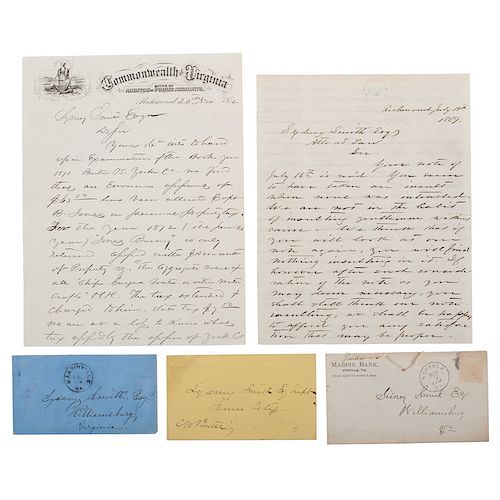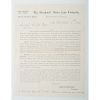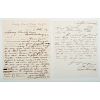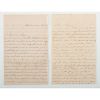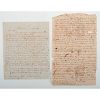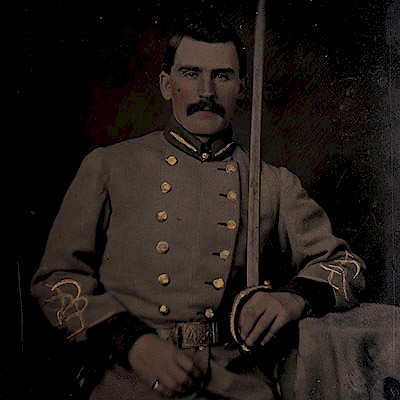Southern Letter Collection of Attorney Sydney Smith, Williamsburg, Virginia
About Seller
6270 Este Ave.
Cincinnati , OH 45232
United States
With offices in Cincinnati, Cleveland and Denver, Cowan’s holds over 40 auctions each year, with annual sales exceeding $16M. We reach buyers around the globe, and take pride in our reputation for integrity, customer service and great results. A full-service house, Cowan’s Auctions specializes in Am...Read more
Two ways to bid:
- Leave a max absentee bid and the platform will bid on your behalf up to your maximum bid during the live auction.
- Bid live during the auction and your bids will be submitted real-time to the auctioneer.
Bid Increments
| Price | Bid Increment |
|---|---|
| $0 | $25 |
| $500 | $50 |
| $1,000 | $100 |
| $2,000 | $250 |
| $5,000 | $500 |
| $10,000 | $1,000 |
| $20,000 | $2,500 |
| $50,000 | $5,000 |
| $100,000 | $10,000 |
About Auction
Jun 22, 2018
Cowan’s American History: Premier Auction, scheduled for June 22, 2018 is comprised of early photographs, documents, manuscripts, broadsides, flags, and more dating from the Revolutionary War, the Civil War, Late Indian Wars, World War I and II and beyond. Cowan's Auctions dawnie@cowans.com
- Lot Description
Lot of approximately 60+ letters relating to two "Smith" families of Virginia, including Civil War-date letters and letters from the Texas frontier. Collection also includes documents related to the legal practice of prominent Williamsburg attorney Sydney Smith (1821-1884).
Sidney Smith was the oldest son of Henry Smith (1798-1866) and Martha Presson Smith (1802-1850) of York County, VA. After graduating from William and Mary College with a Bachelor of Laws in 1846, he married Virginia Constance Bucktrout (ca 1826-1878) and they had seven children. In the years leading up to the Civil War Sydney Smith practiced law in Williamsburg and throughout York and Warwick counties, and served as a commonwealth attorney. Forty year-old Smith enlisted at Williamsburg as a private on June 24, 1861, and mustered into "W" Co. VA 3rd Cavalry. After the war he returned home and resumed his practice. In 1874-75 and 1878-79 Sydney Smith served as a member of the House of Delegates from York County. In his day, he was considered an influential and distinguished citizen.
This collection includes approximately 21 letters written to Smith (bulk ca 1868-1880), most of which are brief with subject matter of a predominantly business nature. The exceptions are two letters from an E. E. Cogbill of Portsmouth, VA. On July 11, 1865, Cogbill writes to Sydney Smith, in part: "…Give me the news of the old city, every thing concerning it is interesting to me. Have the inhabitants returned generally? Did Mr. Blair settle with you? I hope not as the money like the rest of my funds will be useless. I deposited in R. and all is lost-lost. Our poor Confederacy gone and all gone with it. I would rather have lost my poor worthless life-to have had a different state of things-shall we ever recover from it, no never during my brief stay on earth nor for a long, long period thereafter I fear…E. E. C."
Accompanying the Sydney Smith letters are approximately 40 miscellaneous documents including business records, receipts, and legal and bank documents spanning approximately 1831-1942 (majority 1860s-1880s). Notable are an 1848 indenture between a Robert Wilson and William Martin of York County as well as a land lease made on behalf of the US Secretary of War Henry Stimson and Henry Armistead, of Churchland, VA, dated 20 November 1942, for a parcel of land adjacent to the Nansemond Ordnance Depot Military Reservation.
The second Smith family represented in the collection hails from Mathews County, VA. Included are approximately 39 letters with the majority (29) addressed to a Miss Elizabeth Susan Smith (1836-1917), affectionately known to all as "Lizzie." Lizzie Smith was the first of twelve children born to Thomas Sands Smith (1805-1880) and Nancy Foster Brooks (1819-1886). She lived her entire life in Virginia, and seems to have been the touchstone for many family members whose lives took them out of Mathews County or out of the South entirely. Lizzie's father was one of nine children, and it is to her many siblings, cousins, and aunts that Lizzie is a favorite correspondent. The letters of the Smiths of Mathews County were predominantly written in the late 1850s-early 1870s, with the earliest dated letter being from 1846.
Corresponding with Lizzie most frequently is her cousin, Laura Jane Smith (1836-1915). Laura was born in Mathews County in the same year as Lizzie and spent the war years in Virginia. Her letters present the difficulty of living in a war zone while also demonstrating that little things, such as clothing and fashion, remained of interest to southern ladies. Writing from Richmond, [Va.], Oct. 25, [n.d., probably 1863], Lizzie shares, in small part: "…Richmond has been as much excited and there have been many vague rumors here, but I have not yet heard that the place would be evacuated. I hope that they will not be forced to give it up, if so, I think that our cause is desperate indeed. …Cousin Sue & Miss. Margaret have just returned, says that they can get you a very beautiful dress for 25 dollars…Laura." Writing again from Richmond, on August 19, [n.d., probably 1864], Laura shares her despair and anxiety: "My dear Lizzie...I would much prefer talking to writing…recently I feel as if some evil were hanging over me threatening to burst…and [over]whelm me in its mighty vortex of fury. I try to shake it off, but still it cleaves to me as some great incubus, rendering me unfit for social intercourse. All around [me] try to rally me…I feel ashamed to appear to appreciate their kindness so little...last night I was much troubled in my dreams about home. I am not superstitious believer in my dreams and think that it was caused greatly from hearing heavy cannonading yesterday [first day, Second Battle of the Weldon Railroad] and feeling so greatly troubled about my brothers and many dear friends and countrymen. Billy was looking so badly when I saw him that I am ever haunted by his looks. His petition was disapproved and he must still fight. If he leaves what will become of us. God only knows...." The "Billy" referred to here is Laura's brother, William Brooks Smith, VA 4th Cavalry, who was taken prisoner in February 1863, exchanged one month later, and ultimately died in September 1864 from wounds received at Spotsylvania Court House.
Post-war letters also shed light on the difficult times faced by Virginians after the war, and the strong sentiments harbored by many southerners who were forced to rebuild their lives. Confederate Veteran, Private Oscar Shultice, who had served in Company F of the 4th Virginia Cavalry, writes to Lizzie from his Virginia home on November 9, 1865, telling her: "…There has been a great scarcity of money with us as well as all others up here…tell father as negroes have gone up he will have to take my plan and get white labor. I have a lot of Sweeds and I can assure you they are a perfect set of curiosities. I have got them hard at work putting corn in the farm. When I first got them I became a little discouraged with them. They were all sick for a month, but they are all well and working first rate. Mrs. Allen who owns three large estates…sent up a whole boat load last Sunday. There is a great demand for white laborers in Va. It is the intention of the agents in Richmond to bring 200,000 to the state. Its impossible at present to supply the demand. A cargo of Germans has just arrived. Negroes are not willing to work on farms. I got hold of one the other day. He reported me to Mr. Yankey, but Mr. Yankey told him he [was a] guest-he was [being] impetent(sic) [impertinent] to Mr. Shultice. I am anxious to see that gent of color again…Oscar." Hattie Lumiden of Norfolk, VA, shares similarly frank feelings with Lizzie in her letter of June 8, 1866: "…how are you all getting on with & without the "nigger"? I hope better than we are. I wish from the depths of my heart [that] they were all in Africa never to be heard from, but enough of that for I always get angry when I think of them & the intolerable yankies. I talk just as I please here tho' my relatives censure me for it. I have such a perfect hatred for them. I feel that it is a part of my religion almost & to restrain all is impossible for the bible says out of the abundance of the heart the mouth speaketh & I have a heart full of hatred for them…were I to live a thousand years & be as poor as a yankey could make me I could not humble myself to them. I hope I may never be thrown with them for I could not keep from talking…give much love to all those whom you know to be my friends…Hattie L."
After the war, Lizzie continued to receive letters from her cousin Laura Smith, though in approximately 1866 Laura had moved from Mathews County, VA, to Columbia, TX, a community south of Houston. Laura likely served as a "mother's helper" to her older sister Anna Elizabeth Smith Weems who in 1857 was married to a Dr. Mason Weems and by 1866 had several children. Laura's letters from Texas are filled with descriptions of her everyday life, news of family, longing for home, and tales of the difficulties of life in rural Texas.
"I do so want to go to Old Virginia," Laura writes in January 1868, "I wonder how any one that has once lived in Virginia could prefer Texas." Among other things, her eight letters from Columbia lament the lack of good preachers, the bad climate and difficulty growing crops, excitement over a fast-rising river, and descriptions of a terrible epidemic sweeping the countryside. In an October 28 letter, most likely written ca 1867 during one of the most deadly yellow fever epidemics in Texas history, Laura shares news of the devastation brought by "that terrible epidemic which has been more severe, and spread through a greater space of country than ever has been known." She continued, "It is sad to hear of the great distress that it has occasioned in some instances whole families have been taken....Two boats and the cars have been passing constantly, and it is only recently that they have tried to quarantine and even now it is not effectual....I hope though that we will be spared such a scourge."
Note that while the documents in this collection were consigned to Cowan's together and were received as one collection by the previous owner, there is no definitive family link able to be discerned between these two Smith families of Virginia. Still, as both were located in eastern Virginia and as the Smiths of Mathews County were an exceedingly large family, it is possible that there is a connection in the family trees. Also a possibility is that the legal work of Sydney Smith brought him into contact with members of the Mathews County Smith family, as there are mentions of other surnames in his correspondence which also appear in the correspondence and family trees of the Mathews County Smith family. Either way, this southern letter collection provides a wonderful glimpse into the everyday lives of men and women both during the war and afterwards.
Letters are generally in good condition with text easily legible. Exceptions are the earlier letters (1840s) which are toned and one which is completely separated horizontally.Condition
Eliminate the Hassle of Third-Party Shippers: Let Cowan's Ship Directly To You!
If you'd like a shipping estimate before the auction, contact Cowan's in-house shipping department at shipping@cowans.com or 513.871.1670 x219. - Shipping Info
-
Buyers are required to pay for all packing, shipping and insurance charges. Overseas duty charges are the responsibility of the successful Bidder. Be aware that for larger and/or valuable items, shipping charges can be substantial. - If there is no shipping amount on listed your invoice, you will need to make arrangements to pick up or ship your purchase through an alternative shipping company. Our shipping department can be contacted at 513.871.1670 (ext. 219) or email shipping@cowans.com. - Shipping charges include insurance for your order while in transit. If you have private insurance we will adjust your charge to include only packing and shipping. - Please allow 14 – 21 days after payment to package and ship your purchase as carefully as possible.
-
- Buyer's Premium



 EUR
EUR CAD
CAD AUD
AUD GBP
GBP MXN
MXN HKD
HKD CNY
CNY MYR
MYR SEK
SEK SGD
SGD CHF
CHF THB
THB